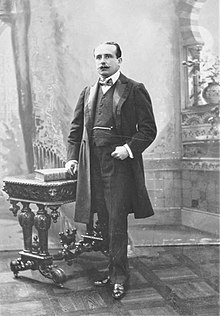José Pardo y Barreda
| José Pardo | |
|---|---|
 |
|
| 42nd President of Peru | |
|
In office September 24, 1904 – September 24, 1908 |
|
| Preceded by | Serapio Calderón |
| Succeeded by | Augusto B. Leguía |
| 46th President of Peru | |
|
In office August 18, 1915 – July 4, 1919 |
|
| Preceded by | Oscar Benavides |
| Succeeded by | Augusto B. Leguía |
| Prime Minister of Peru | |
|
In office September 8, 1903 – August 1, 1907 |
|
| President | Eduardo López de Romaña |
| Preceded by | Eugenio Larrabure y Unanue |
| Succeeded by | Alberto Elmore Fernández de Córdoba |
| Personal details | |
| Born |
José Simón Pardo y Barreda 24 February 1864 Lima, Peru |
| Died | 3 August 1947 (aged 83) Lima, Peru |
| Political party | Civilista Party |
| Occupation | Politician |
José Simón Pardo y Barreda (February 24 in Lima, Peru, 1864 – August 3, 1947 in Lima, Peru) was a Peruvian politician who served as the 42nd ( 1904 - 1908) and 46th (1915 - 1919) President of Peru.
Born in Lima, Peru, he was the son of Manuel Justo Pardo y Lavalle, who had been the first civilian president of Peru (1872-1876) and the founder the Civilista Party; he is one of two second-generation Peruvian presidents (Manuel Prado, son of former dictator Mariano Ignacio Prado, is the other). His grandfather, Felipe Pardo y Aliaga (1806-1868), was a distinguished diplomat, writer and politician who was also Foreign Minister and Vice President of the Peruvian Council of State before, during and after the presidencies of Vivanco and Castilla.
José Pardo headed the Civilista Party and was Foreign Minister under Eduardo López de Romaña and then Prime Minister (1903-1904) under Manuel Candamo. After Candamo's death, Serapio Calderón became the interim president and called for new elections. The Civilista Party named José Pardo as its candidate, while the Democratic Party presented the candidacy of Nicolás de Piérola, who retired early before the elections mentioning a "lack of guarantees." This fact led Pardo to become elected. Both his presidential terms were marked by liberal politics.
His government was marked by pushing for better education for all Peruvians. The elementary education in Peru, according to the Law of 1876 proposed by his father, Manuel Pardo, was under the responsibility of the municipalities throughout the country. José Pardo, under his Secretary of Justice and instruction, decided to confront the problem.
The law promulgated in 1905 reformed the education system to depend on the Central Government. It also called for primary education to be free and compulsory in far away places such as villages and mines, and that at least a small school for all children be located in any place with more than two hundred inhabitants. The Escuela Normal de Varones ("Normal school for males") was founded for the formation of male teachers, as well as the Escuela Normal de Mujeres ("Normal school for females").
...
Wikipedia
